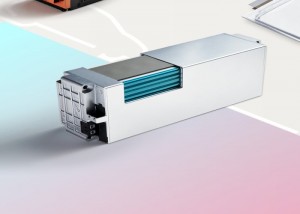Electric vehicle battery
Korean battery makers take charge in global EV market outperforming rivals
By Sep 01, 2020 (Gmt+09:00)
2
Min read
Most Read
Samsung shifts to emergency mode with 6-day work week for executives


CJ CheilJedang to sell feed, livestock unit for $1.4 bn


Samsung Electronics' key M&A man returns; big deals in the offing


Affinity to buy SK Rent-a-Car at $572 mn, more deals expected


Keppel REIT to sell Seoul-based prime office T Tower


South Korean battery makers LG Chem Ltd., Samsung SDI Co., and SK Innovation Co. are steaming ahead in the global electric vehicle market pulling in a combined 35.6% market share, while industry peers lag behind.
LG Chem maintained its position as the industry frontrunner accounting for 2.8GWh of the total 10.5GWh global EV battery use in August, according to market research firm SNE Research on September 1. A single GWh can charge 20,000 EV units.
The chemical arm of LG Group also remained in the lead in the January to July period, securing 25% market share in global EV battery usage. Samsung SDI came in fourth and SK Innovation came in sixth with market shares of 6.4%┬Āand 4.1%, respectively.
The┬Āthree companies' combined market share in the global EV market more than doubled from 15.9% in 2019. The domestic┬ĀEV trio is making massive inroads with one of every three EVs on the market running on a Korean battery.
Meanwhile, industry competitors, including ChinaŌĆÖs Contemporary Amperex Technology Co. (CATL), and JapanŌĆÖs Panasonic saw their footings weaken. CATL came in second followed by Panasonic in third, posting market shares of 23.8% and 18.9%, respectively. But their cumulative battery use dropped significantly by 25.5% for CATL, and 30.9% for Panasonic.

Korean battery makersŌĆÖ rising prominence can be credited to EuropeŌĆÖs EV market growth. Up until 2019, China had led┬Āthe global EV market, but the tables turned when the Chinese market slowed in the wake of the coronavirus coupled with the governmentŌĆÖs cutback of subsidies.┬ĀThis worked against China-based CATL, which relies heavily on sales from the domestic market.
During this period, the EU rolled out robust eco-friendly measures that boosted EV sales in Europe. During the first half of this year, the EU posted EV sales around 410,000 units, which surpassed sales of 380,000 units in China, according to EV market database EV Volumes.
The domestic battery makers have benefited from increased sales of EVs that are equipped with Korean batteries, such as the Renault Zoe, the Audi e-tron, and the Porsche Taycan.
Also, EuropeŌĆÖs EV market feels like home┬Āground for Korean battery makers given that the European market accounts for almost 70% of LG ChemŌĆÖs EV business. Samsung SDI also has BMW and Volkswagen as clients.
The three Korean companies are likely to ride the momentum as they increase investments into the EV market. The Korean Investors earlier reported that the three Korean battery makers spent a combined 1.08 trillion won ($1 billion) in EV-related R&D projects in the first half of this year.
Write to Man-Su Choe at bebop@hankyung.com
┬Ā
LG Chem maintained its position as the industry frontrunner accounting for 2.8GWh of the total 10.5GWh global EV battery use in August, according to market research firm SNE Research on September 1. A single GWh can charge 20,000 EV units.
The chemical arm of LG Group also remained in the lead in the January to July period, securing 25% market share in global EV battery usage. Samsung SDI came in fourth and SK Innovation came in sixth with market shares of 6.4%┬Āand 4.1%, respectively.
The┬Āthree companies' combined market share in the global EV market more than doubled from 15.9% in 2019. The domestic┬ĀEV trio is making massive inroads with one of every three EVs on the market running on a Korean battery.
Meanwhile, industry competitors, including ChinaŌĆÖs Contemporary Amperex Technology Co. (CATL), and JapanŌĆÖs Panasonic saw their footings weaken. CATL came in second followed by Panasonic in third, posting market shares of 23.8% and 18.9%, respectively. But their cumulative battery use dropped significantly by 25.5% for CATL, and 30.9% for Panasonic.

Korean battery makersŌĆÖ rising prominence can be credited to EuropeŌĆÖs EV market growth. Up until 2019, China had led┬Āthe global EV market, but the tables turned when the Chinese market slowed in the wake of the coronavirus coupled with the governmentŌĆÖs cutback of subsidies.┬ĀThis worked against China-based CATL, which relies heavily on sales from the domestic market.
During this period, the EU rolled out robust eco-friendly measures that boosted EV sales in Europe. During the first half of this year, the EU posted EV sales around 410,000 units, which surpassed sales of 380,000 units in China, according to EV market database EV Volumes.
The domestic battery makers have benefited from increased sales of EVs that are equipped with Korean batteries, such as the Renault Zoe, the Audi e-tron, and the Porsche Taycan.
Also, EuropeŌĆÖs EV market feels like home┬Āground for Korean battery makers given that the European market accounts for almost 70% of LG ChemŌĆÖs EV business. Samsung SDI also has BMW and Volkswagen as clients.
The three Korean companies are likely to ride the momentum as they increase investments into the EV market. The Korean Investors earlier reported that the three Korean battery makers spent a combined 1.08 trillion won ($1 billion) in EV-related R&D projects in the first half of this year.
Write to Man-Su Choe at bebop@hankyung.com
┬Ā
Danbee Lee edited this article
More to Read
Comment 0
LOG IN







